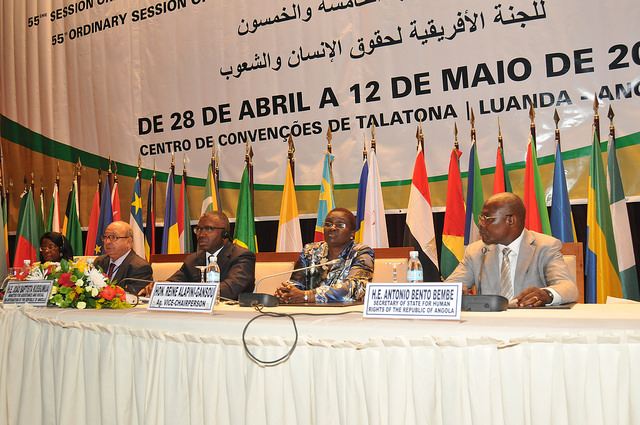
Credit: ACHPR
The African Commission on Human and Peoples’ Rights adopted a landmark resolution (Resolution 275) condemning acts of violence, discrimination and other human rights violations against persons on the basis of their sexual orientation and/or gender identity during its 55th Ordinary Session held from April 28 to May 12, 2014 in Luanda, Angola. See ACommHPR, Res. 275: Protection Against Violence and other Human Rights Violations Against Persons on the Basis of their Real or Imputed Sexual Orientation or Gender Identity, 55th Session, 28 April-12 May 2014. Particularly in light of ongoing controversies concerning LGBTI rights in a number of African countries, the adoption of Resolution 275 by the principle human rights body in Africa is an important step towards the equal recognition of the rights for all persons regardless of sexual orientation or gender identity.
Resolution 275
Resolution 275 confirms that acts of violence, discrimination and other human rights abuses affecting LGBTI persons and human rights defenders in Africa violate State obligations under the African Charter on Human and Peoples’ Rights. The Resolution recognizes the rights of all persons under the African Charter to freedom from discrimination (Article 2), equal protection of the law (Article 3), respect for life and integrity of person (Article 4), and freedom from torture, cruel, inhuman and degrading treatment (Article 5).
Resolution 275 specifically highlights the Commission’s alarm at acts of violence against sexual minorities in Africa, including “‘corrective’ rape, physical assaults, torture, murder, arbitrary arrests, detentions, extra-judicial killings and executions, forced disappearances, extortion and blackmail.” According to the resolution, the Commission is also “deeply disturbed” by the failure of law enforcement agencies to investigate and prosecute crimes targeting persons on the basis of their sexual orientation or gender identity.
The resolution condemns these acts of violence and discrimination – by both State and non-State actors – and urges States to enact and enforce laws prohibiting violence targeting persons on the basis of their sexual orientation or gender identity, ensure “proper investigation and diligent prosecution of perpetrators,” and establish judicial procedures that address the needs of the victims.
Resolution 275 also acknowledges the violence and abuse experienced by human rights defenders and civil society organizations that work on issues related to sexual orientation or gender identity. The Commission calls on States to “ensure that human rights defenders work in an enabling environment that is free of stigma, reprisals or criminal prosecution as a result of their human rights protection activities, including the rights of sexual minorities.”
Civil society organizations welcomed the adoption of Resolution 275. [ISHR; HRC; Human Rights First] In a joint statement, local, national, regional, and international organizations celebrated the resolution as the “first step towards affirming the equality and dignity of all African people who have been targeted and continue to be treated as second-class citizens because of their real or perceived sexual orientation and gender identity and expression.” [Coalition of African Lesbians]
The African Commission reported the adoption of the resolution in the Final Communiqué of the 55th Ordinary Session.
LGBTI Rights in Africa
The passage of this resolution is both significant and timely considering the accounts of ongoing human rights abuses against LGBTI persons in Africa and the criminalization of homosexuality in a substantial number of African States. Reports from civil society organization indicate widespread acts of violence against LGBTI persons committed by both State and non-State actors. See, e.g., African Men for Sexual Health and Rights & Coalition of African Lesbians, Violence Based on Perceived or Real Sexual Orientation and Gender Identity in Africa (2013); Amnesty International, Making Love a Crime (2013).
Additionally, several countries in Africa criminalize homosexuality. Amnesty International, Making Love a Crime (2013). Two of the African Commission’s Member States, Uganda and Nigeria, recently passed more severe laws criminalizing homosexuality. In January, the President of Nigeria, a State which already criminalized sex between persons of the same sex, signed a new anti-gay law prohibiting public displays of affection between persons of the same sex and punishing persons who support or participate in gay organizations. [NY Times] Similarly, Uganda passed the Anti-Homosexuality Act which authorizes the imposition of life imprisonment for certain sexual acts between consenting adults and for entering into a same-sex marriage, and criminalizes the promotion of homosexuality. [Amnesty International]
The African Commission’s Special Rapporteur on Human Rights Defenders in Africa spoke out against both laws and expressed concern at the negative impact that the laws would have on both sexual minorities and human rights defenders. [ACHPR: Implications of the anti-homosexuality Act; ACHPR: Implications of the Same Sex Marriage [Prohibition] Act 2013]
African Commission on Human and Peoples’ Rights
The African Commission on Human and Peoples’ Rights is the principal body responsible for the protection and promotion of human rights in the 53 Member States of the African Union. All of the Member States have ratified the African Charter on Human and Peoples’ Rights.
The Commission holds two ordinary sessions each year and may also hold extraordinary sessions at the request of the Chairperson of the Commission or a majority of Commissioners. During ordinary sessions, the Commission considers periodic reports submitted by States, as well as reports from members of the Commission and its special mechanisms. Additionally, the Commission may consider reports concerning country visits, or special missions, which are typically dispatched to countries experiencing political or social unrest.
The Commission also accepts communications, or complaints, from individuals, groups of individuals, NGOs, and States concerning alleged violations of the African Charter on Human and Peoples’ Rights.
More information on the African human rights system is available here on IJRC’s website.
